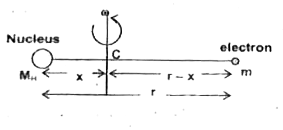If the angular momentum of a body is zero about some point. Is it necessary that it will be zero. About a differet point?
To determine whether the angular momentum of a body being zero about one point implies that it will also be zero about a different point, we can analyze the concept of angular momentum.
1. Understanding Angular Momentum:
Angular momentum (L) of a body about a point is defined as:
L=r×p
where r is the position vector from the point to the body, and p is the linear momentum of the body, given by p=mv (mass times velocity).
2. Condition for Zero Angular Momentum:
For the angular momentum to be zero about a point, the following conditions can be satisfied:
- The position vector r is zero (the point of reference is at the location of the body).
- The linear momentum p is zero (the body is at rest).
- The body is moving in such a way that the cross product r×p=0 (this can happen if r and p are parallel).
3. Changing the Reference Point:
If we change the reference point to another point, the position vector r will change. Since angular momentum depends on the position vector, it is possible for the angular momentum about a different point to be non-zero.
4. Conclusion:
Therefore, if the angular momentum of a body is zero about one point, it does not necessarily mean that it will be zero about a different point. The value of angular momentum can vary based on the position vector relative to the new point.
Final Answer:
No, it is not necessary that the angular momentum will be zero about a different point.
---
Angular momentum (L) of a body about a point is defined as:
L=r×p
where r is the position vector from the point to the body, and p is the linear momentum of the body, given by p=mv (mass times velocity).
For the angular momentum to be zero about a point, the following conditions can be satisfied:
- The position vector r is zero (the point of reference is at the location of the body).
- The linear momentum p is zero (the body is at rest).
- The body is moving in such a way that the cross product r×p=0 (this can happen if r and p are parallel).
If we change the reference point to another point, the position vector r will change. Since angular momentum depends on the position vector, it is possible for the angular momentum about a different point to be non-zero.
Therefore, if the angular momentum of a body is zero about one point, it does not necessarily mean that it will be zero about a different point. The value of angular momentum can vary based on the position vector relative to the new point.
No, it is not necessary that the angular momentum will be zero about a different point.
Topper's Solved these Questions
- ROTATIONAL MECHANICSBook:DC PANDEY ENGLISHChapter:ROTATIONAL MECHANICSExercise:Exercise 12.6
Explore 4 Videos
- ROTATIONAL MECHANICSBook:DC PANDEY ENGLISHChapter:ROTATIONAL MECHANICSExercise:Exercise 12.7
Explore 2 Videos
- ROTATIONAL MECHANICSBook:DC PANDEY ENGLISHChapter:ROTATIONAL MECHANICSExercise:Exercise 12.4
Explore 11 Videos
- ROTATIONBook:DC PANDEY ENGLISHChapter:ROTATIONExercise:(C) Chapter Exercises
Explore 39 Videos
- ROTATIONAL MOTIONBook:DC PANDEY ENGLISHChapter:ROTATIONAL MOTIONExercise:Integer Type Questions
Explore 17 Videos
Similar Questions
If the angular momentum of a body is found to be zero about a point is it necessary that it will also be zero about a different point?
View SolutionIf the resultant torque of all the forces acting on a body is zero about a point is it necessary that it will be zero about any other point?
View SolutionA body is in translational equilibrium under the sctin of coplanar forces. If the torque of these force is zero about a point is it necessary that it will also be zero abut any other point?
View SolutionAngular momentum of a planet about the point of it's apogee is
View Solution
The angular momentum of the atom about the centre of mass will be
View SolutionA : If angular momentum of an object is constant about a point then net torque on it about that point is zero.
R : Torque is equal to the rate of change of angular momentum.
View SolutionThe angular momentum of an electron is zero. In which orbital may it be present?
View SolutionThe angular velocity of a rigid body about any point of that body is same :
View SolutionA : For a body to be in rotational equilibrium the net torque acting on the body about any point is zero.
R : For net torque to be zero, net force should also be zero.
View SolutionAngular momentum of a rigid body rotating about a fixed Axis with angular velocity →ω
View Solution

